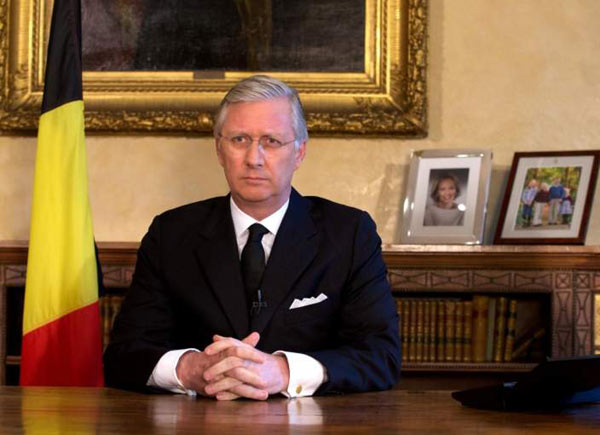EU's 'forgotten ones' easy targets for extremism
Updated: 2016-03-24 07:53
By Chu Yin(China Daily)
|
|||||||||
 |
|
Belgian King Philippe delivers a speech from Brussels Royal Palace following bomb attacks in Brussels and Belgium's National airport of Zaventem , Belgium March 22, 2016. [Photo/Agencies] |
The terrorist attacks at the airport and a subway station in Brussels on Tuesday came just a few days after the Belgian police captured Salah Abdeslam, the suspected leader of November's Paris attacks, in a recent raid.
It is both astonishing and lamentable that Belgium, a European Union member state known for its generosity toward immigrants and its diverse culture has fallen prey to terror attacks.
It seems something is wrong with the social governance and security situation in the European Union. It is noteworthy that Islamic extremism, one of the biggest security concerns for the EU, has actually developed from within.
Marginalized, cold-shouldered and radicalized, these extremists have European identities, a clear understanding of what is going on in their neighborhoods, and deep grudges against society.
These "forgotten ones" are easy targets for religious extremism, as they lack any sense of belonging. They constitute a major threat to regional stability and will continue to be one, if local governments refrain from making efforts to bridge the gap between the haves and the havenots.
Following the EU's expansion and integration, the massive inflows and outflows of people within EU borders, have become a headache for many countries' security authorities, as terrorists have even plotted cross-border assaults under the cover of the "free migration" in Europe. Intelligence activities and the surveillance of certain individuals often involve sovereignty and state secrets, and European countries, especially those with less intelligence resources, always find it difficult to keep a closer eye on local security affairs and prepare for latent dangers.
In fact, "Western liberalism" seems to have resulted in European governments gradually losing their control over security, as they have allowed terrorists to disseminate extremism and recruit terrorists via the Internet.
Given the increasing number of terrorist attacks inside the EU community, the price for freedom may be too high for all economies, many of which are already struggling to fight back in the face of the barbaric attacks. For them, it is almost impossible to safeguard their national security with just their own strengths.
However, the prospects of other options, including soliciting support from a unified European security agency and a total retreat back to original borders, are equally dim-the former is not in line with the sovereignty of countries, while the latter is hardly possible.
The author is an associate professor at the University of International Relations, and a research fellow at the Center for China and Globalization.
Related Stories
One Briton missing, four wounded in Brussels attacks 2016-03-23 20:54
Belgians identify two suspected bombers in Brussels blasts 2016-03-23 15:24
Czech Republic tightens security following Brussels attacks 2016-03-23 14:11
Premier Li mourns victims of Brussels attacks 2016-03-23 12:13
Police issue wanted notice for suspect after Brussels attacks 2016-03-23 10:01
Victims of Brussels attacks commemorated 2016-03-23 03:08
Today's Top News
Inspectors to cover all of military
Britons embrace 'Super Thursday' elections
Campaign spreads Chinese cooking in the UK
Trump to aim all guns at Hillary Clinton
Labour set to take London after bitter campaign
Labour candidate favourite for London mayor
Fossil footprints bring dinosaurs to life
Buffett optimistic on China's economic transition
Hot Topics
Lunar probe , China growth forecasts, Emission rules get tougher, China seen through 'colored lens', International board,
Editor's Picks

|

|

|

|

|

|







